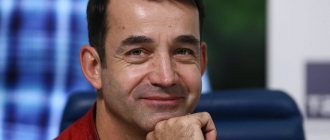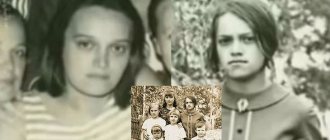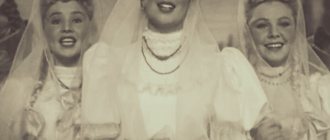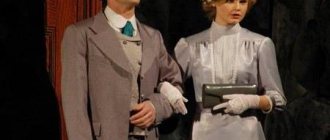Childhood and youth
The director and actor was born into a creative family in the spring of 1941 in Moscow. Andrei’s father is the famous Russian writer Sergei Smirnov, who wrote the novel “Brest Fortress.” The ancestors of his mother Virginia Smirnova were representatives of different nationalities - Jews on his father’s side and Armenians on his mother’s side.
Andrei Smirnov’s half-starved childhood was burned by the war; he had to grow up during the years of rebuilding the country from ruins. As a child, the future director did not dream of a career in theater or cinema, although the atmosphere in the house was creative.
Andrey Smirnov in his youth.
Published by Alexandra Me Flowers Thursday, August 29, 2019
Andrei Smirnov In his youth,
Andrei planned a working specialty, but in high school he became interested in cinema and enjoyed attending performances in the capital's theaters.
Smirnov was interested in the process of creating films and productions, so after graduating from school he entered VGIK, choosing the directing department. I ended up in the workshop of the famous master of Russian cinema, Mikhail Romm. In 1962, Andrei was awarded a diploma.
Personal life
In the man’s personal life there were two striking unions. His first marriage to actress Natalya Rudnaya, which he entered into in his youth, ended in divorce. The family had two daughters, Avdotya and Alexandra.
The eldest Dunya chose a creative path - she became a screenwriter, writer and popular director. Her active life position has influenced her social activities: since 2012, she has been a co-founder of the “Vykhod” charitable foundation. The organization provides assistance to children suffering from autism.
The younger Alexandra moved to live in London, where she works for a large company not related to cinema.
Elena Prudnikova and Andrey Smirnov
Published by AZ Museum Thursday, June 22, 2020
Andrei Smirnov and his wife Elena Prudnikova
Andrei Sergeevich met his second wife Elena Prudnikova on the set. A daughter, Aglaya Smirnova, was born into this family. Today she works as an editor at the Marmot film studio with Valery Todorovsky.
11 years later, when the director was 50 years old, his wife gave him an heir, son Alexei. The guy followed in his father’s footsteps and graduated from VGIK, directing department. Together they starred in the documentary project “Dynasty” in 2013.
Andrey Sergeevich is a happy grandfather of two adult grandchildren, daughter Aglaya Taisiya and son Avdotya Smirnova Danila. He is also proud of his relationship with Anatoly Chubais, who in 2012 became the director’s son-in-law.
The actor does not use social networks, but his photos appear on Instagram in thematic accounts dedicated to Russian cinema.
Professional life
After graduating from VGIK, Andrei Smirnov became heavily involved in directing. At the same time, he tried himself as a script writer.
1963 marks the directorial debut of Andrei Smirnov. The film “Hey, Somebody” was released. It is worth noting that she caused a stir with her appearance. Critics received it ambiguously.
A year later, the film “An Inch of Earth” was released on the big screen, which was a huge success. This picture established Andrei Smirnov as a young but talented director. When Andrei turned thirty years old, as they say, his “finest hour” came - the universally recognized film “Belorussky Station” (1971).
Smirnov made his debut as an actor in 1986 in the film “Red Arrow”.
Smirnov was lucky enough to play the writer of the early 20th century - Ivan Bunin. For this role in 2000-2001, he received prizes from various organizations: the festivals “Stalker”, “Listopad”, “Nika”, “Literature and Cinema”. From 2003 to 2020 he starred in the TV series: The Idiot, The Optimists, The Thaw, Particle of the Universe.
In 2011, his film “Once Upon a Time There Was a Woman” was released, which once again emphasized the director’s talent. Currently, Andrei Smirnov is at a fairly advanced age, but is still faithful to his calling, whose name is cinema.
Movies
Andrei Smirnov took his first steps in cinematography as a student. He starred in episodes of several popular feature films - “They are calling, open the door”, “White Sun of the Desert”. The roles did not bring fame, but they did add experience.
In his final years at VGIK, a student made the short films “Yurka - the Pantsless Team” and “Hey, Someone!” Teachers and critics praised the work of the aspiring director and predicted a successful career for him, but his meteoric rise did not happen.
In 1964, the premiere of the military drama “An Inch of Earth” took place, starring Alexander Zbruev and Evgeniy Urbansky. The film about the hot summer of 1944 was liked by both viewers and film officials.
Andrey Smirnov in the film “Contact”
The film turned out to be the only problem-free project of Andrei Smirnov. All further films by the young director met with a cold reception and were mercilessly cut up by the censor's scissors. Some projects ended up on the shelves of the Goskino archive: they were banned from showing.
The breakthrough came in 1970, when the military drama “Belarusian Station” was released, starring Evgeny Leonov, Anatoly Papanov, Vsevolod Safonov and Nina Urgant. The film is still called the best film about the Great Patriotic War today. In 1971, “Belorussky Station” received the main award at the Karlovy Vary Film Festival.
Four years later, Andrei Smirnov directed the melodrama “Autumn,” in which the main roles went to Leonid Kulagin and Natalya Rudnaya. Supporting roles were played by Natalya Gundareva and Alexander Fatyushin. But the censors saw explicit shots in the film, which they mistook for a very modest bed scene by today’s standards. Perhaps the film was shelved because of the poems of the disgraced writer and poet Boris Pasternak that were featured in it.
Andrey Smirnov in the movie "Dinosaur-2"
In 1979, Andrei Smirnov shot a 2-part production drama “Faith and Truth” based on the script by Alexander Chervinsky. This is the first Soviet film about the place and importance of architecture in life, about housing construction during the reign of Nikita Khrushchev. But due to censorship pressure, the director had to cut down the plan and throw out many “seditious” scenes. As a result, the tape turned out to be emasculated, all the sharp corners were smoothed out.
Not believing that the censors would allow his plans to be realized, Andrei Smirnov quit directing. Acting saved me from poverty. In 1986, he starred in the production drama Red Arrow and the melodrama My Favorite Clown.
Among the best acting works of Andrei Sergeevich are roles in the melodrama by Rodion Nakhapetov “Coming Next” and in the feature film based on the story of the same name by Sergei Yursky “Chernov”. In the latest project, Smirnov played the main character. Sergei Yursky, Elena Yakovleva and Oleg Basilashvili appeared in the film.
Andrey Smirnov in the film "Casanova's Cloak"
In 1993, the films “Dreams of an Idiot” and “Casanova’s Cloak” were released. The first project is a joint film between Russia and France based on the novel “The Golden Calf” by Ilya Ilf and Yevgeny Petrov. Smirnov got the role of Koreiko in it. Russian director Alexander Galin shot the second film with Italians. The main role in the film is played by Inna Churikova. Andrei Smirnov appeared in the image of the artist Daphnis.
A year later, the actor made his debut on the theater stage. He staged the play “Dinner” based on the play by Jean-Claude Briseville at the Moscow Theater of Oleg Tabakov.
Demand and great success came to the artist in the early 2000s. In 2000, the premiere of Alexei Uchitel’s biographical drama “The Diary of His Wife” about the life of the writer Ivan Bunin took place. The main character was played by Smirnov. The author of the script was Dunya Smirnova, his daughter.
In 2003, viewers saw a film adaptation of Fyodor Dostoevsky’s novel “The Idiot.” The 10-episode film was directed by Vladimir Bortko, and the main roles went to Evgeny Mironov, Vladimir Mashkov, Lydia Velezheva and Inna Churikova. Andrei Smirnov appeared in the image of Totsky. In the same year, the performer was awarded the title of People's Artist of Russia.
Andrey Smirnov in the film “Black Cats”
The actor often stars in sensational TV series. He played prominent roles in the projects “Moscow Saga” and “Apostle”. In 2005, the premiere of the Polish drama “Persona Non Grata” by Krzysztof Zanussi took place, where Smirnov played the role of the secretary of the Russian Deputy Minister of Foreign Affairs. In the same year, the actor appeared in the film adaptation of Alexander Solzhenitsyn’s novel of the same name “In the First Circle,” where he played Bobynin.
In 2008, the film “Fathers and Sons” was released by the artist’s daughter Avdotya Smirnova, where Andrei Sergeevich got the role of Pavel Kirsanov. Three years later, the actor’s filmography was replenished with a landmark work - Andrei Zvyagintsev’s drama “Elena”, where he played one of the key roles. The film premiered in Cannes in 2011. The film won the Un Certain Regard jury prize and was seen in 45 countries around the world.
In the same year, Andrei Smirnov returned as a director. He presented to the audience an epic canvas about the events that took place in Russia from 1909 to 1921. The film “Once Upon a Time There Was a Woman” touched on the theme of the Civil War and the Tambov uprising.
The guest of the “Subscriber Available” program on Radio Baltkom on Tuesday will be the director (“Belorussky Station”), actor Andrei Smirnov.
Ask questions. After 13 o'clock. Published by Vadim Radionov Monday, May 11, 2020
Andrey Smirnov now
The main character of the story is a young woman, Varvara, who lost her husband almost immediately after the wedding. The film was warmly received by film critics and viewers. At the “Window to Europe” film festival she was awarded a special prize, and Andrei Sergeevich himself became a laureate of the “Nika” award. Smirnov spoke about his work in an interview with Vladimir Pozner.
In 2013, Andrei Smirnov pleased fans with his appearance in the popular TV series “Black Cats” and “Thaw”. In the spring of 2014, the artist signed a letter from Russian filmmakers in support of Ukraine.
In 2020, Andrei Sergeevich presented his book “Burdocks and Quinoa,” in which he presented his thoughts on the development of Soviet and Russian cinema.
In 2020, the man appeared in the series “Optimists” by Alexei Popogrebsky. This is a historical adventure drama about Soviet diplomats in the 1960s. The project premiered in the spring of 2020 on the Rossiya-1 TV channel.
Trailer for Andrey Smirnov’s film “The Frenchman”
The main roles in the series went to Vladimir Vdovichenkov, Severiya Janusauskaite, Egor Koreshkov and Rinal Mukhametov. Masters Yuri Kuznetsov and Anatoly Bely also appeared in the film. Viewers saw Andrei Smirnov in the image of the main character's father-in-law.
In the summer of 2020, the 75-year-old director complained about the disruption of filming of the film, the working title of which was “The Frenchman.” This is a film based on a 2014 script written by Smirnov about the times of the Thaw in Moscow. Money from sponsors appeared in 2015, at the same time Andrei Sergeevich began filming. But in 2020, the bank in which the funds were kept “burst”, and filming had to be stopped.
Despite all the difficulties, Smirnov managed to finish work on his film, and it was released in 2020. The news about the drama's screening pleasantly pleased the man's fans.
“My son-in-law Chubais”: director Andrei Smirnov spoke about family and oligarchs
On the other side of the barbed wire...
— Andrei Sergeevich, you yourself said that in your old age you suddenly began to play thieves in law. How did you come up with this wonderful image?
— No, when I was nearly sixty, I played the Nobel laureate in literature Bunin. And last year, in one series he played the head of Roscosmos, and in another series, called “Caviar,” he played a member of the Politburo. It had a pretty interesting script, good actors, a talented young director. And everything else - yes, some kind of bandits, criminals.
- And why do young directors see you this way, and you agree...
“But the roles are interesting, and our job is not to disdain the work.” If the script is decent, then why not. After all, I earn my bread as an artist.
— But when you, the director, play for your young colleagues, do you become such an obedient artist? “Your place is in the buffet,” as director Soloviev said to his colleague Govorukhin when he played in his film “Assa”?..
“I never build anyone up for myself.” In my experience, there is no artist more obedient than the director. The director simply knows that the finished picture is in the head of only one person, so if you go to film, you try to do as best as possible what the director wants from you. This is a rule of craft and has nothing to do with art. Trying to change something is stupid. I had a very successful role, from my point of view, in the series “Black Cats” directed by Lavrentiev - there I played a Rostov thief in law, an old Jew, and spoke more Odessa than Rostov.
- We know, we know, yes.
“And now spectators come up to me on the street and recognize me.”
- These are the ones who just left the zone?
- No, ordinary people. Although, of course, these roles require consultants, experienced people who should be nearby and give advice.
— Experienced people from the Ministry of Internal Affairs or on the other side of the barbed wire?
- Either with one or the other. I did not have the opportunity to communicate with thieves in law, but with people who traveled on the other side of the wire - yes, I was able to meet such consultants.
“I don’t turn on the TV, I don’t read newspapers”
— As it’s fashionable to say now, your latest film is “Once Upon a Time There Was a Woman.” Let's not talk about the latter...
- Last, last.
- But it seems to me that you have other ideas, but that’s not about it now... The film is wonderful, but who gave the money for it? A third was given by the state, and then by Koch, Abramovich, Chubais, Vekselberg. Well, Vladislav Surkov helped the most. Listen, you are a democrat by conviction. To use the language of your current characters, did you feel bad about taking money from them?
- I do not understand you. Cinema throughout the world is made somewhere with the participation of the state, but mainly with private money. Today there is very little money in cinema, people work extremely hard, fifteen hours a day, young directors make TV series for pennies. But good quality films are expensive, and it is impossible to make them without private investors. Whatever you take from the best paintings of recent times is all private money. Moreover, Khlebnikov’s wonderful film “Arrhythmia,” which just won at Kinotavr, was also financed independently of the state, and there is nothing shameful in that.
“But in my opinion, the private is different from the private.” Mr. Surkov was the main Kremlin political strategist with all that it entails. Abramovich, who feels great in London, in my opinion, is no different from Khodorkovsky, who served ten years. Kokh, who made a big splash on NTV, and now suddenly became a democrat. Isn't it disgusting?
— Firstly, don’t forget that the film started in 2007, and then everything sounded a little different.
— Okay, I won’t go over these characters anymore. Although this is my attitude towards them, and I have the right to it. But you are a well-known critic of the current government policy...
— Well, I signed some collective letters with political overtones, but I don’t consider myself an expert in politics and generally try to stay away from it. I don’t turn on the TV, except for football and tennis, I haven’t watched anything for several years. I don’t read newspapers, except for Sport Express sometimes.
— And do you take all your information from the Internet?
— From children... I have four adult children, all of them are on the Internet. Sasha, are you interested in my political views?
- Including, because you are made of this too. You recently met with Svetlana Alexievich...
— Yes, I have great respect for her, she deservedly became a Nobel Prize laureate.
- This is not discussed. But when she says that perhaps the Russian language should be banned in Ukraine for some time in order to unite the nation, do you agree with this?
- That's her business. Kyiv has been a Russian-speaking city all its life, and remains so. I filmed there last year. But, you know, this is such a sore subject, let’s not...
“Zvyagintsev is the best director in the last hundred years”
— You played an oligarch in Zvyagintsev’s film “Elena,” in my opinion, his best film. Zvyagintsev, from your point of view, what kind of director is this? Why does each of his films become a very important statement?
— The late, unfortunately, Daniil Dondurei, who was the editor-in-chief of the magazine “Art of Cinema” and the largest sociologist of Russian cinema, once explained to me that Andrei Zvyagintsev is the greatest Russian director since 1908. Neither Eisenstein nor Tarkovsky can compare with him, because every film by Zvyagintsev becomes an event in world cinema. It seems to me that this characteristic is exhaustive.
Still from the film "Elena".
- But what is this film about? About the fact that there is a people who rose in 1717 from rags to riches... A people that some might call cattle, some might call them the electorate. This film is about the fact that we, perhaps, are again standing on the threshold of a revolution, because many of us consider the rise of some and the complete humiliation of others to be unfair. And the last will be first, right?
-You are too thoughtful. I am an artist there and did only what the director wanted, nothing more.
- But there is no contempt for these people who find themselves below, for the marginalized?
- Contempt? This is not an artistic category. An artist (and Zvyagintsev is, of course, an artist) will never allow himself to despise his people.
- Of course, he simply poses this question. How do you personally feel about these so-called ordinary people?
— You’ve seen the film “Once Upon a Time There Was a Woman.” Well, who is the hero there? People.
“But you can treat people differently. We have one such wonderful director, although he is called a gentleman, he loves the people very much. Well, aren’t you Professor Preobrazhensky in this sense?
- Well, of course not. I have a Soviet upbringing, a pioneer and a Komsomol member, what kind of Professor Preobrazhensky am I? Here again Bunin, a Nobel laureate, who was considered a snob, hated the revolution, the Bolsheviks, wrote the story “The Village” in 1909. Is it possible to more strongly express your attitude towards the people, to feel like a part of it, with all your aristocracy and grace?..
“But when these people came to power, Bunin wrote “Cursed Days,” calling the peasant a boor, and went into exile.
- This is wrong. In “The Village” there is the main character Tikhon Ilyich, Kuzma, his brother, peasant children - they have the same attitude. And there is also the newly-minted boor Denisk, whom Bunin despises and hates. That is, some are the Tikhons, who find themselves in a tragic situation, and others are the Denisks, who picked up rifles and followed Comrade Lenin. So “The Village” and “Cursed Days” are absolutely integral works. Bunin saw both the bright and the dark in the people.
“I paid off my debts only under Gorbachev”
— Your most subtle “Belorussky Station” and “Autumn” - the first, by the way, Soviet erotic film...
- Although there is only one sex scene.
- So innocent, too. But I heard about the heroes of “Belorussky Station” that these were failed people, that they had a lost life, that everything that was important remained there, in the war. But this is all nonsense, you weren’t filming about lost people...
- For them, the war is youth and victory, in which the main events in their lives happened, but all four of them felt confident in a peaceful life: one is an accountant, another is a mechanic, the third is a boss, the fourth is a journalist. They are aware of their merits, their dignity...
Still from the film “Belorussky Station”.
- Just without pathos.
“This picture was closed four times, they were reproached for the lack of a heroic beginning, they said: “We won, but your destinies are all unsettled.” Why are they unsettled? They have a life like other people. Of course, they live with the knowledge that they did not live their lives in vain. Another question is that their homeland is more like a stepmother than a mother. And in general, how much are their merits appreciated? But that's not what the film is about.
— I’m now reading Nadezhda Mandelstam’s second book. She writes there that for many people it was life after the war that became the true test. He writes that during the war they were in the ranks, and maybe then it was easier for everyone to go on the attack together under bullets than later, in peaceful life, for everyone to be responsible for themselves. And these people, after the Victory, did a lot of mean things, betraying their friends, signing “collectives” against them, refusing to communicate at all with those who fell under Stalin’s steamroller...
- Peaceful life still forces you to make choices almost every day - you can’t do without exams. It’s just that at the front all this was more obvious, clearer. But, yes, not everyone can survive a peaceful life. It's always been like that.
- But then one film was closed, then another, and you quit directing altogether so as not to be humiliated anymore.
— Yes, the director inevitably became a professional liar. If you wanted to film something even slightly different from ordinary bubblegum, you had to hide your intentions: write one thing, film another, and edit a third. Not showing the most spectacular shots to the artistic council and the party committee, inserting scenes that would temporarily lull the vigilance of the authorities and then be thrown out... Unfortunately, the moment of reckoning still came - handing over the finished film. This is where the catastrophe began, the struggle for every frame, for every meter.
- So you left.
— It was 1979, I was 38 years old. The last film I shot was “Faith and Truth.” I'm not ashamed of it, there are very good things there, wonderful acting work. This is a big film, two-part, about an architect played by Sasha Kalyagin. But the film was stopped in the middle, and, as the then director of Mosfilm Sizov told me: “You think you spent a million, and we’ll give you a second one? Until this is redone, there will be no funding.” And we had to remove it scene by scene. Everything there was done in the style of absurdity, but it turned out that absurdity was impossible, that it was offensive. They thought they were guiding us ideologically, but I had artistic differences with them.
- “Stylistic differences with the Soviet regime” - as Sinyavsky said.
- Yes it is. I left and didn’t film anything for twenty-nine and a half years.
— A mercantile question, excuse me: what did you live on in this case?
— I tried to retrain as a writer - like a Soviet film director retrained to become a Soviet writer. I wrote, or rather, learned to write scripts and plays, then began acting as an artist. He staged at the theater, taught... In Europe he gave master classes here and there. That's how it existed. In fact, I was able to pay off my debts only during Gorbachev’s time. Then they first took “Angel,” my short film, off the shelf, and paid me production fees - after more than twenty years, can you imagine?! At the same time, the “Autumn” category was revised and re-released. They allowed a play that was not allowed. And I also became the head of the Union of Cinematographers and received a salary. And according to the nomenclature of that time, this was a position equal to the minister of the USSR. That's how it all came together.
photo: Gennady Cherkasov
Film director Andrey Smirnov.
“I’m not colleagues with Mikhalkov”
— Yes, that memorable V Congress of the Union of Cinematographers in 1986. There was also an uprising against the “film generals.” And the “film generals” were, for a moment, Sergei Bondarchuk, Lev Kulidzhanov, Grigory Chukhrai...
— I was not at the fifth congress; no one elected me as a delegate there. Although I wrote a couple of speeches to my friends, and these friends later became secretaries of the new Union. But there one of my friends shouted my name, and the next morning I found out that I was on the board. And for three years I sat there in the office, from morning to night.
- And at that congress Nikita Mikhalkov spoke, who went against the grain, against you revolutionaries, in order to protect all these respected, great directors.
“Since then, he has hated filmmakers with mortal hatred.
- But it was an act on his part...
- Just as servile as everyone else.
“He practically went against you all alone then.”
“Because he was sure that everything would end the way it always ended.” Don’t forget at what point in the congress he did this - when the outcome was still undecided, when it was still unknown that the leadership of the Politburo would not interfere. Well, what kind of heroism is that - he was a hereditary lackey, and remains so.
— But in my opinion, in Soviet times, Mikhalkov was a decent and free person, he made wonderful films. What happened next is his problem.
— I remember how cameraman Pavel Lebeshev, with whom we made “Belorussky Station” and “Angel,” was visiting me at my dacha in Peredelkino. He directed Nikita’s first film, “One of Our Own Among Strangers...” This film, based on Kapler’s Kinopanorama, is presented by Mikhalkov for the first time - and what words does Nikita say? “We dedicate our film to our valiant security officers.” This is the beginning, this is the first film.
“But this film is so complex, contradictory and simply magnificent, isn’t it?” Recently we found a quote from Svetlana Alexievich forty years ago, where she glorifies Dzerzhinsky... People change, yes. Didn't you have any similar statements?
- Yes, he probably said something about the revolution. But the fact is that when I was already filming “Angel”, and I was 26 years old, I had already read samizdat, got my hands on Russian philosophy, I already understood a lot. No wonder the film was shelved and I was deprived of my job. And I don't remember saying anything like that since then.
- But why did you talk so disdainfully and condescendingly about Mikhalkov’s “Sunstroke” on “Echo of Moscow”? You are colleagues, you are both great directors. Did you deliberately decide to insult him publicly?
“I didn’t set myself the task of insulting him; I was asked about “Sunstroke”, I answered. Because I think this is a shameful picture, Bunin would simply roll over in his grave. I believe that God exists, because while Mikhalkov behaved more or less decently, he was filming “The Mechanical Piano” - a wonderful picture...
- “Oblomov”...
- Well, is this Oblomov? There are wonderful scenes there... But it’s not for nothing that many directors wanted to shoot “Oblomov” - they didn’t give it to anyone, they only gave it to Mikhalkov on the condition that Tabakov would play. And the last three paintings by Mikhalkov are shameful. The Lord took the gift. He had a gift, but now he doesn’t. Mikhalkov and I are not colleagues: we left the Union, organized another Union, so as not to be under the same roof with him and not to hear what he says.
“I admire Chubais and his team”
- Of all your children, I know only one wonderful girl - Dunya. What has she been doing lately, writing, filming? After all, before, films and scripts came one after another, but now, except for the cry of the soul in defense of Serebrennikov (“so that you don’t have anything standing there!”), it is neither heard nor seen.
“She starts filming a new film in July. But Dunya created a Fund to help children who suffer from autism. This is her main job, she devotes a lot of effort and time to it.
- It is very important. Andrey Sergeevich, how do you like your new son-in-law?
“I always loved and respected him very much.” We march in the same formation, only he commanded, and I was one of the officers.
photo: Natalia Gubernatorova
Daughter Dunya and beloved son-in-law.
—Are you an officer in Chubais’s army?..
- But of course! Gaidar and Chubais are two of the most outstanding men in modern history.
— Doesn’t the fact that Chubais’ deputies are being “closed down” one after another bother you?
“It’s all a fake; they are decent, honest people.” I admire Chubais and his team... Why don’t you ask me about my directorial affairs? It's a disaster for me!
- What kind of disaster?
— I have a script written back in 2014. Money appeared - at the end of 1915, work began at the same Valera Todorovsky studio where I made “Baba”. The full-length film will most likely be called “The Frenchman.” “Thaw” Moscow 1957. The location and the actors had already been chosen, the acting auditions began... Last May I was supposed to start filming. But recently the bank burst, which contained two million dollars in sponsorship money and at the same time everything that my wife and I have earned over the past forty years. At 75 years old I was left with a bare bottom. The film had to be stopped. More than a year has passed since then. I'm busy looking for new sponsors, but so far it hasn't led to anything. And since I’m already old, what’s left for me... I live on pins and needles. I really wanted to make this picture, but the chances are getting smaller and smaller. I can’t go to the Ministry of Culture. I was advised to ask the Cinema Fund for money, and like a fool, I agreed. We presented a picture, I said something there... As a result, I took 52nd place out of 52. I wrote letters to rich people, oligarchs, but not one of them honored me with an answer.
— Where are those who financed your previous film? At least the same Vekselberg?
- He refused.
- Abramovich?
- The million he gave me has disappeared.
- What does this million mean to him? I would give him more.
- Well, I can’t ask the question. But I hope that I will be able to get at least some money.
Andrey Smirnov now
In May 2020, the premiere of the 2nd season of the comedy series “Dinosaur” about the former “safeguard” Semyon Babushkin began.
In the new series, the hero of Andrei Smirnov, together with his friend, the character of Alexander Pankratov-Cherny, starts his own business, opening a company for opening doors. But on their way, the elderly adventurers meet real swindlers in the person of father and son Kuritsyn, played by Valery Barinov and Alexander Oleshko.
Now the film “Empire V” is being prepared for release, in which Andrei Sergeevich played the role of the vampire Osiris. You can hear Smirnov today on the radio “Echo of Moscow”, in the programs “Persons” and “Dithyramb”.











